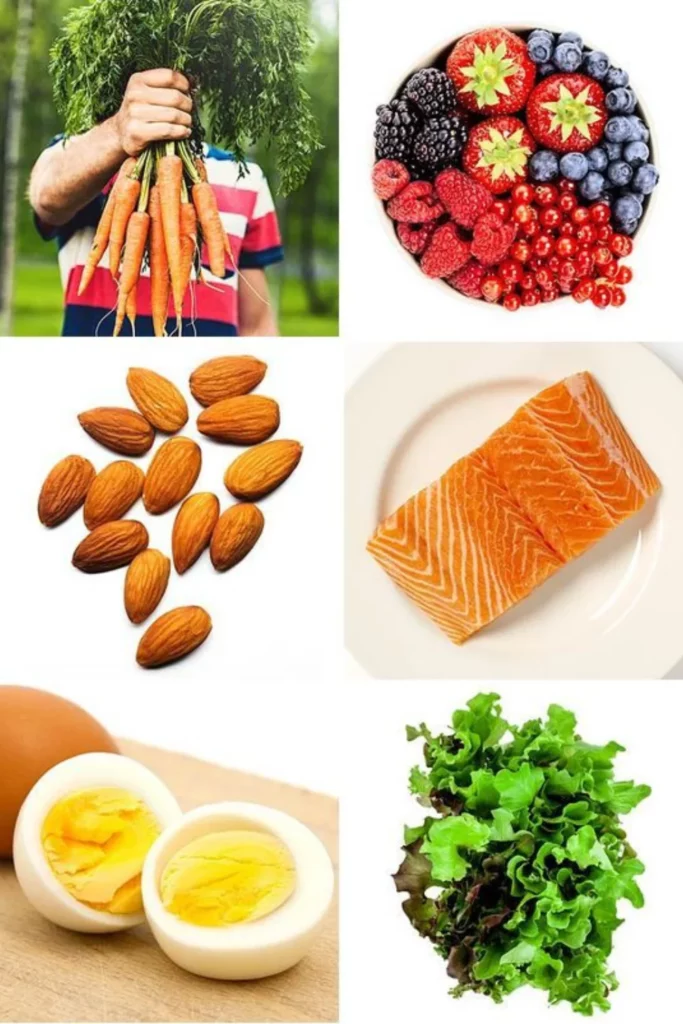20 best food for eyesight with tips to improve eyesight

Foods that can help improve eyesight are those that contain nutrients, vitamins, and antioxidants that support eye health and protect against eye diseases. These foods include fruits, vegetables, fish, nuts, and seeds that are rich in nutrients like beta-carotene, lutein, zeaxanthin, omega-3 fatty acids, vitamin E, and vitamin C. Eating a diet that includes these foods can help maintain healthy eyes and reduce the risk of age-related eye diseases like cataracts and macular degeneration. However, it’s important to note that while these foods can support eye health, they cannot cure or treat existing eye conditions. It’s always best to consult a healthcare professional for personalized advice and treatment.
Here are 20 foods that can help improve eyesight and support eye health:
- Carrots
- Spinach
- Kale
- Collard greens
- Sweet potatoes
- Broccoli
- Citrus fruits (oranges, grapefruits, etc.)
- Berries (blueberries, strawberries, raspberries, etc.)
- Grapes
- Tomatoes
- Avocado
- Almonds
- Walnuts
- Pistachios
- Chia seeds
- Flaxseeds
- Salmon
- Tuna
- Mackerel
- Sardines
These foods are rich in nutrients that are beneficial for eye health, including beta-carotene, lutein, zeaxanthin, omega-3 fatty acids, vitamin E, vitamin C, and zinc. Incorporating a variety of these foods into your diet can help maintain healthy eyes and reduce the risk of age-related eye diseases like cataracts and macular degeneration.
Which food is best for eyesight?

There are many foods that can help improve eyesight and maintain eye health. Here are some examples:
- Carrots: Carrots are rich in beta-carotene, a type of vitamin A that helps protect the eyes and improve eyesight in low light conditions.
- Leafy greens: Vegetables like spinach, kale, and collard greens are good sources of lutein and zeaxanthin, which are antioxidants that help protect the eyes from damage caused by free radicals.
- Fish: Fatty fish like salmon, tuna, and sardines are rich in omega-3 fatty acids, which have been shown to help prevent age-related macular degeneration and other eye diseases.
- Eggs: Eggs are a good source of lutein and zeaxanthin, as well as vitamin D, which has been linked to a reduced risk of macular degeneration.
- Berries: Berries like blueberries, raspberries, and blackberries are high in antioxidants that help protect the eyes from damage.
- Nuts and seeds: Almonds, walnuts, and chia seeds are all good sources of vitamin E, which has been shown to help prevent cataracts and other eye diseases.
- Citrus fruits: Oranges, grapefruits, and other citrus fruits are rich in vitamin C, which can help reduce the risk of cataracts and macular degeneration.
Overall, a diet rich in fruits, vegetables, and healthy fats can help improve eyesight health and reduce the risk of eye diseases.
Here are some tips on how to improve eyesight with foods:

- Eat a diet rich in fruits and vegetables: Fruits and vegetables are high in antioxidants, vitamins, and minerals that are essential for improve eyesight and eye health. Aim to eat a variety of colorful fruits and vegetables every day, including leafy greens, carrots, sweet potatoes, citrus fruits, and berries.
- Include sources of omega-3 fatty acids in your diet: Omega-3 fatty acids are important for eye health, and can be found in fatty fish like salmon, tuna, and mackerel, as well as chia seeds, flaxseeds, and walnuts.
- Eat foods high in vitamin A: Vitamin A is important for maintaining healthy vision, and can be found in foods like carrots, sweet potatoes, pumpkin, and spinach.
- Incorporate foods high in lutein and zeaxanthin: Lutein and zeaxanthin are antioxidants that can help protect the eyes from damage and reduce the risk of age-related eye diseases. Foods high in these nutrients include leafy greens, broccoli, peas, and eggs.
- Choose whole foods over processed foods: Processed foods are often low in nutrients and can contribute to inflammation in the body. Choose whole foods like fresh fruits and vegetables, nuts, seeds, and whole grains instead.
- Avoid excessive alcohol consumption and smoking: Both alcohol and smoking can contribute to eye diseases and other health problems. Limit your alcohol consumption and avoid smoking to help maintain healthy eyes and overall health.
- Exercise your eyes: Eye exercises can help to improve blood circulation and strengthen the muscles in your eyes. You can try exercises such as the palming exercise, the figure eight exercise, and the near and far focusing exercise.
- Eat a healthy diet: Eating a diet that is rich in fruits and vegetables, especially those high in vitamin A and beta-carotene, can help to maintain good eye health.
- Get enough sleep: Getting enough sleep is important for maintaining good overall health, including your eyes. Lack of sleep can cause eye strain and dry eyes.
- Take breaks from screen time: Staring at a computer or phone screen for long periods can cause eye strain and fatigue. Taking frequent breaks and looking away from the screen can help to reduce the strain on your eyes.
- Protect your eyes from the sun: UV rays from the sun can damage your eyes, so it’s important to wear sunglasses that offer UV protection.
- Get regular eye exams: Regular eye exams can help to detect any eye problems early, before they become more serious.
Remember that while eating a healthy diet can support eye health, it’s important to also get regular eye exams and consult with a healthcare professional for personalized advice and treatment.
What causes bad eyesight?

There are several factors that can cause bad eyesight, including:
- Genetics: Inherited genetic factors can increase the risk of certain eye conditions such as myopia (nearsightedness), hyperopia (farsightedness), and astigmatism.
- Age-related changes: As we age, our eyes undergo changes that can affect our vision. These changes include presbyopia (age-related difficulty in focusing up close), cataracts (clouding of the lens), and age-related macular degeneration (damage to the retina).
- Environmental factors: Prolonged exposure to bright sunlight, ultraviolet light, and blue light from electronic devices can damage the eyes and increase the risk of certain eye conditions.
- Medical conditions: Certain medical conditions such as diabetes, hypertension, and multiple sclerosis can cause vision problems.
- Medications: Certain medications such as corticosteroids and antihistamines can cause vision problems as a side effect.
- Eye injuries: Eye injuries such as a blow to the eye, a foreign object in the eye, or exposure to chemicals can damage the eyes and affect vision.
- Poor nutrition: A diet lacking in essential vitamins and nutrients, especially vitamin A, can lead to poor eyesight.